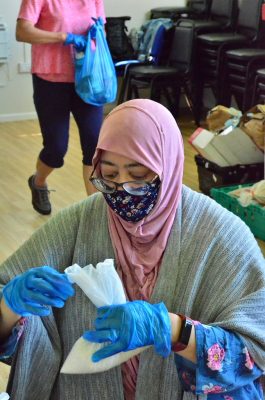Over the last few months it’s been incredible to witness how the people of Brighton & Hove have adapted to the Covid-19 crisis. The many groups, organisations and individuals we work with across the city were already dealing with significant inequalities which have only intensified as the crisis has unfolded. These community champions are now dealing with additional challenges amidst a vast uncertainty of what is yet to come.
Our city has mobilised to take action and make sure the most vulnerable in our communities are not forgotten. It’s community activity at its finest and at TDC we have not only been impressed by the actions of groups and individuals but incredibly proud of our staff who have adjusted their roles to do what is needed during this unprecedented situation.
We’ll be sharing stories over the next few weeks about some of the amazing community initiatives that have risen out of the Covid-19 crisis and how our team has been able to support those local people taking action. Able to act as a trusted conduit between the communities we work with and statutory services, we have been focusing our pandemic response work on people in poverty and BAME people who are disproportionately affected by Covid-19. Our role is more vital than ever, as we help ensure lifesaving supplies, support and information is provided to the people who need it most, helping them access food and combat isolation and supporting communities to lead the response to this crisis.
This week's stories focus on some of our work with Black, Asian and Minority Ethnic groups across the city. We are currently working with 10 BAME groups, reaching around 700 people. The Social Prescribing Plus, Community Roots and MESH aspects of our work are specifically geared to address the inequalities already experienced by these communities. We also have a short project scoping ways to link communities with services and explore ways they can adapt to meet BAME needs.
Current priorities for us during the pandemic include:
- supporting community leaders and volunteers in BAME community groups, helping to keep people connected and well through both online and offline support.
- ensuring people have access to accurate UK information.
- participating in proactive outreach to overcome known barriers such as language & literacy skills, digital exclusion, uncertainty of rights and lack of knowledge of public sector services.
- managing referrals and supporting food banks to supply culturally appropriate food.
Here is the first example of what one of the BAME groups in the city has been doing:
Overcoming the language barrier for Bangladeshi women
It has been identified that some ethnic groups have been disproportionately affected by the Covid-19 pandemic. In terms of health, Public Health England released a report at the start of June entitled “Disparities in the risk and outcomes of COVID-19”.
Regarding ethnicity, the report states that death rates from COVID-19 were highest among people of Black and Asian ethnic groups. Specifically, “an analysis of survival among confirmed COVID-19 cases and using more detailed ethnic groups, shows that after accounting for the effect of sex, age, deprivation and region, people of Bangladeshi ethnicity had around twice the risk of death than people of White British ethnicity”.
Numerous barriers have long meant that people from the Bangladeshi community are less likely to engage with healthcare providers than other ethnic groups, and the pandemic has only acted to increase this legacy in health inequality.
BAME Community Development Worker Sayanti Banerjee works on our Community Roots mental health project and on the Social Prescribing Plus wellbeing project, working 1-to-1 with people to help them improve their own health and wellbeing. Since the Covid-19 crisis began she has been working with Mish, a member of the Moulsecoomb Bangladeshi Women's group who has been volunteering in the community for many years and who has been providing assistance to people throughout the pandemic. One major challenge has been the language barrier, which has restricted people’s access to food and health advice.
Mish has been calling people in the Bengali community to see what help is needed - connecting people to food banks, mosques, and directing people to sources of help for queries around things such as benefits and mental health. She’s also been speaking with people who want to offer help - ensuring their donations and support are directed where it can be best used.
Using her extensive knowledge of local services, Sayanti has been able to work with Mish - linking her up with support and resources; finding relevant information; and connecting Mish to places that can help with benefits, job centre contact info, how to contact the council, etc.
Sayanti’s specialist knowledge through her work as a community development worker and more recently as a social prescribing case worker, has given her a firm understanding of how to navigate a complex system that can sometimes be difficult to understand. Sayanti speaks to Mish every other day on a case-specific basis – and uses these calls to also give support and make sure that Mish is okay herself, reassure her, and make sure she's taking care of her own wellbeing.
This acknowledgement of the disparities coupled with the additional support available to people in the Bangladeshi community, means that people have been able to access help when they need it most. The hope is that this increase in knowledge and skills will ultimately improve the way individuals and families can take care of their own wellbeing beyond the pandemic and far into the future.

Read all the Covid Heroes' stories →
--
